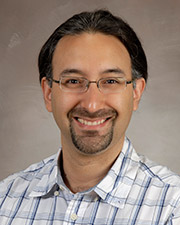Morales selected for National Academies review

The National Academies of Sciences, Engineering, and Medicine has announced Rodrigo Morales, PhD, professor in the Department of Neurology, as a committee member for its Review of Transmission and Geographic Spread of Chronic Wasting Disease in U.S. Cervid Populations.
“I feel honored to serve on this committee that includes a wide variety of expertise,” Morales said. “In addition to the contributions I can make to it, I am sure that this will be a great learning experience. Considering the recent and soon-to-come contributions that our team has made to understand multiple aspects of CWD biology, I believe that I can help build a useful reference document that may shape future policies involving this terrible disease.”
Chronic wasting disease is a fatal prion disease affecting the central nervous system of cervids, such as deer, elk, reindeer, sika deer, and moose. Prion diseases are caused by the abnormal folding of the prion proteins that form clumps in the brain.
The disease was first detected in Colorado in 1967 and is thought to spread among cervids through contact with saliva and other fluids. It is now found in more than 26 states and two Canadian provinces. The committee will review the state of knowledge about modes of transmission and means of geographic spread of CWD. Specifically, the committee will draw conclusions about the state of knowledge regarding:
- The infectious dose of CWD and different modes of disease transmission among cervids;
- The means of geographic spread through cervid dispersal, scavenger activity, and human actions;
- The effectiveness of interventions to reduce transmission and/or geographic spread of the disease; and
- The population-level and economic impacts of CWD and the effectiveness of different interventions to reduce those impacts.
Morales boasts more than 15 years of experience in the field of protein misfolding diseases, specifically in prion and Alzheimer’s diseases. He has extensive experience in protein biochemistry and animal pathology. His main research topics involve the strain and species barrier phenomena in prion disease, like the prion-like nature of Aβ aggregates in Alzheimer’s disease and the pathological interaction between amyloidogenic proteins.
The National Academies of Sciences, Engineering, and Medicine are private, nonprofit institutions that provide expert advice on some of the most pressing challenges facing the nation and world. The work of the academies helps shape sound policies, inform public opinion, and advance the pursuit of science, engineering, and medicine.